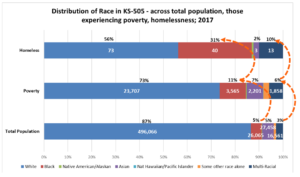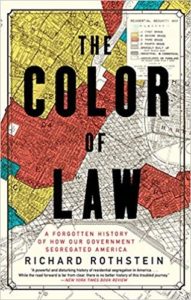RACIAL AND ETHNIC DISPARITIES IN HOMELESSNESS
Each year, Johnson County's Continuum of Care on Homelessness (KS-505 CoC) counts persons who are experiencing homelessness and collects information about them to help us understand not only who is experiencing homelessness in our community but also the complex and interacting factors that contribute to their housing history.
In past years, annual reports have noted that racial and ethnic minorities in the community are over-represented in the annual Point in Time Count (PIT) of homelessness. They represent higher proportions of the total count than they do the general population or the population experiencing poverty. In 2019, the KS-505 CoC is delving deeper into these disparities in homelessness to understand and identify contributing factors and intentionally take steps to address them in order to achieve equity and improve outcomes. Ending homelessness is the goal of the CoC. That goal cannot be achieved without addressing the root causes and systems that result in disparate outcomes for different populations.
As shown in the graph below, while African Americans/Blacks made up 5% of Johnson County's total population in 2017, they made up 11% of those living in poverty (below 100% of the federal poverty level or FPL), and 31% of those who were literally homeless. Similarly, those who identified as Multi-Racial made up 3% of the total population, while they made up 6% and 10% of those living in poverty and those experiencing homelessness in 2017, respectively.
The CoC's Racial and Ethnic Disparities in Homelessness (R/EDH) work team has been meeting since April 2019 to examine disparities by race and ethnicity in KS-505's homeless response system - first by examining whether racial and ethnic disparities exist and for what groups, then exploring what strategies might be implemented to address them.
For KS-505, this analysis is the CoC is first step towards establishing equity in the homelessness system. Click here to read the full fact sheet.

LOOKING AT THE HISTORY AND IMPACT OF RACISM
Understanding what impacts the health and well-being of our community has been the focus of UCS for its more than 50-year history. Since 2017, UCS and community partners involved in the Johnson County Health Equity Network have worked collaboratively to take on the priority health equity issue of attainable and sustainable housing with grant support from the Kansas Health Foundation and REACH Healthcare Foundation.
Health equity is defined as everyone having a fair and just opportunity to be as healthy as possible - which requires removing obstacles to health such as poverty, discrimination, and their consequences, including powerlessness and lack of access to good jobs with fair pay, quality education and housing, safe environments, and health care. Social and economic factors that impact a person's health are called the social determinants of health. Fully understanding these determinants includes a better understanding of the role race and racism has in our health and wellbeing.
This month, the American Academy of Pediatrics (AAP) published a policy statement which includes racism as a social determinant of health and details the impact of racism on child and adolescent health. The AAP notes that the "objective of this policy statement is to provide an evidence-based document focused on the role of racism in child and adolescent development and health outcomes. This policy statement will allow pediatricians to implement recommendations in practice that will better address the factors that make some children more vulnerable than others".
 As more and more organizations recognize the negative impact of racism on a community's health and well-being, it is important to understand how racism has been codified in our history. Richard Rothstein's 2017 book - The Color of Law: A Forgotten History of How Our Government Segregated America is a great place to start. Rothstein is a distinguished fellow of the Economic Policy Institute, a senior fellow, emeritus, at the Thurgood Marshall Institute of the NAACP Legal Defense Fund and a senior fellow of the Haas Institute at the University of California (Berkeley) and in 2017 gave a talk on his book here in Kansas City. He is also a part of the short film Segregated by Design - a 17 minute film which examines the forgotten history of how our federal, state and local governments unconstitutionally segregated every major metropolitan area in America through law and policy.
As more and more organizations recognize the negative impact of racism on a community's health and well-being, it is important to understand how racism has been codified in our history. Richard Rothstein's 2017 book - The Color of Law: A Forgotten History of How Our Government Segregated America is a great place to start. Rothstein is a distinguished fellow of the Economic Policy Institute, a senior fellow, emeritus, at the Thurgood Marshall Institute of the NAACP Legal Defense Fund and a senior fellow of the Haas Institute at the University of California (Berkeley) and in 2017 gave a talk on his book here in Kansas City. He is also a part of the short film Segregated by Design - a 17 minute film which examines the forgotten history of how our federal, state and local governments unconstitutionally segregated every major metropolitan area in America through law and policy.


